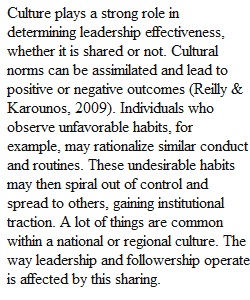


Q Think back to the readings and videos covered in Module 5. For two or more of these questions, share your answers with other classmates. 1. In your own work, what role does culture play in determining leadership effectiveness, whether it is shared or not? What advice can you provide for global leaders with regards to the practice of shared leadership? 2. Does the organization you work for have a well-conceived vision? If so, describe what you consider to be the core ideology (including its core values and core purpose) and envisioned future that its vision captures. If not, why not? What do you think its core ideology and envisioned future should be? 3. In your own words, describe the concept of shared leadership and discuss how it is manifest in today's organizations. Have you experienced shared leadership in your work? If so, provide examples. If not, why not? Is it something about your work context that limits its applicability, or do you think the people you work with prefer more traditional forms of leadership? NOTE: Be sure to answer two or more questions. Your initial posting in response to these questions should be a minimum of one well-developed paragraph and a maximum of three paragraphs. Your responses to classmates must be substantive and add value to the conversation. See the "Rubric for Asynchronous Discussion Participation" for more information on the discussion board expectations and assessment criteria.
View Related Questions